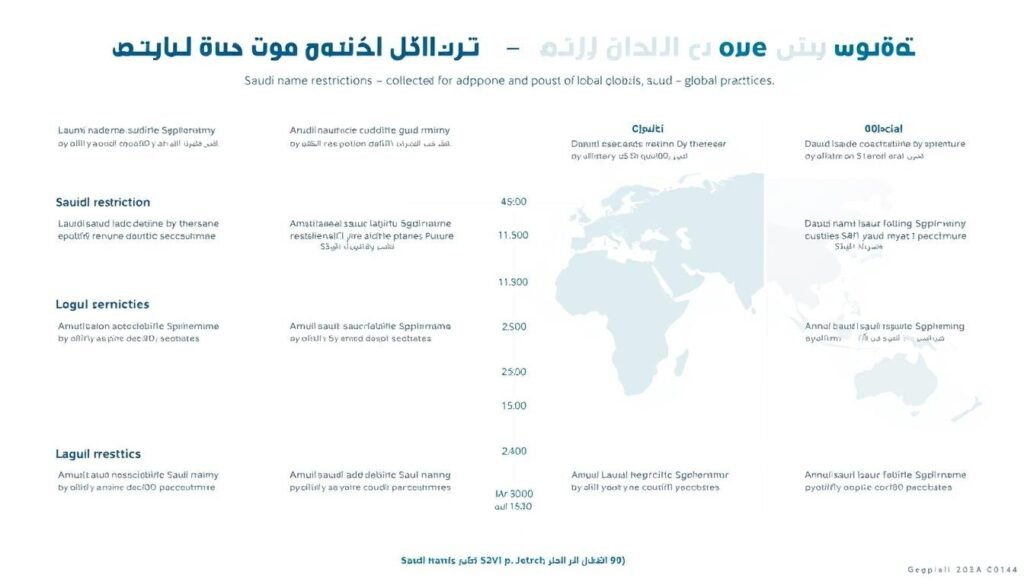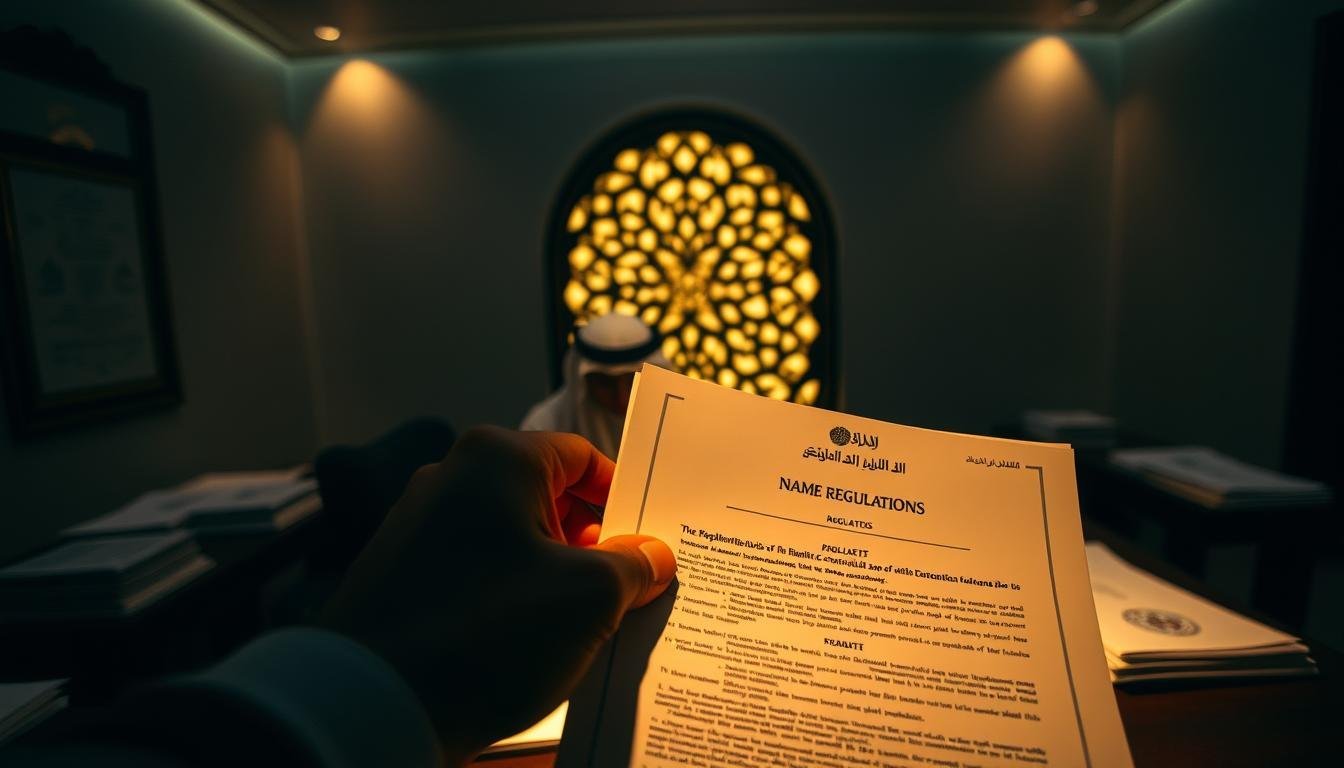Have you ever wondered why the name Linda is banned in Saudi Arabia? This mystery is tied to the country’s strict rules on culture and religion.
In Saudi Arabia, names must follow strict rules to match the country’s values. The ban on names like Linda shows how serious these rules are. Learning about these rules helps us understand the mix of culture and law in Saudi Arabia.
Looking into this topic, you’ll see how names in Saudi Arabia are shaped by religion and law. This gives us a deeper look into the cultural identity of the region.
Contents
- 1 The Saudi Arabian Name Regulation System
- 2 Why is the Name Linda Banned in Saudi Arabia?
- 3 Cultural and Religious Context of Saudi Naming Practices
- 4 Other Foreign Names on Saudi Arabia’s Banned List
- 5 Impact on Families and Individuals
- 6 Comparing Saudi Name Restrictions with Global Practices
- 7 Conclusion on Saudi Naming Practices and the Linda Name Ban
- 8 FAQ
- 8.1 Why is the name Linda banned in Saudi Arabia?
- 8.2 Who regulates names in Saudi Arabia?
- 8.3 What are the criteria for approving or rejecting names in Saudi Arabia?
- 8.4 Are there other foreign names banned in Saudi Arabia besides Linda?
- 8.5 How do Saudi Arabia’s naming regulations affect families and individuals?
- 8.6 How do Saudi Arabia’s naming practices compare to those in other countries?
- 8.7 Can I change my name if it’s already registered and later becomes banned?
- 8.8 What is the role of Islamic law in Saudi Arabia’s naming conventions?
The Saudi Arabian Name Regulation System
The government of Saudi Arabia has a strict name rule to keep the country’s culture and religion in check. This rule is key to keeping the Islamic identity and cultural heritage alive.
The Ministry of Interior is at the heart of this effort. It decides if a name is okay or not based on certain rules.
Role of the Ministry of Interior in Naming Conventions
The Ministry checks names to make sure they fit the naming conventions in Saudi Arabia. Names that go against the country’s values are not allowed. This includes names that are too different or might cause confusion.
The Ministry looks at if a name could be seen as offensive or against Islamic teachings. The
By controlling names, the Saudi Arabian government wants to keep its culture strong. It makes sure the names given to children reflect the country’s values and beliefs.
Why is the Name Linda Banned in Saudi Arabia?
The name Linda is banned in Saudi Arabia for cultural and religious reasons. It means “beautiful” or “pretty.” This name is loved worldwide for its simplicity and beauty.
Reasons Behind the Ban
The ban on Linda in Saudi Arabia comes from several reasons:
- Cultural differences: The name Linda might not fit the cultural or religious standards.
- Religious interpretations: Islamic naming rules could play a part in the ban.
- Regulatory compliance: Saudi Arabia’s name rules aim to follow cultural and religious norms.
Linda has a rich history and cultural significance globally. Yet, in Saudi Arabia, names must align with cultural and religious values. The country’s naming laws reflect these values.
To understand the Linda ban, we must look at Saudi Arabia’s culture and religion. The strict naming rules help keep cultural identity strong and follow religious norms.
Important factors include:
- Following Islamic naming rules.
- Being culturally sensitive and avoiding foreign or inappropriate names.
- Having rules to enforce naming standards.
By looking at these points, we can see why names like Linda are banned in Saudi Arabia.
Cultural and Religious Context of Saudi Naming Practices
In Saudi Arabia, names are chosen with great care. This is because of the country’s strong cultural and religious ties. Islamic law is at the heart of these naming traditions.
Cultural Preferences in Naming
In Saudi Arabia, people often choose names that reflect Islamic values. Names seen as Islamic or with deep Islamic history are popular.
Islamic law shapes naming practices in many ways:
- Names must align with Islamic values and morals.
- Names seen as blasphemous or disrespectful to Islamic figures are banned.
- Names with negative meanings or those seen as immoral are not allowed.
The cultural and religious ties in Saudi Arabia are very strong. This means names that don’t fit these norms are not used.
Several factors decide if a name is accepted or not:
- Does it follow Islamic law?
- Is it culturally and historically significant?
- Could the name be misunderstood or cause confusion?
It’s important to understand these points to get the full picture of naming in Saudi Arabia. These factors help explain why certain names are chosen or rejected.
Other Foreign Names on Saudi Arabia’s Banned List
Saudi Arabia’s naming laws affect many foreign names, not just Linda. The country has strict rules. These rules cover many names that don’t fit with the culture or religion.
Curious about other banned names? Some names are banned because they don’t fit with the Islamic faith or Saudi traditions.
Reasons for Banning Foreign Names
There are many reasons for banning these names. One big reason is to keep Saudi Arabian culture and religion strong.
| Name | Reason for Ban |
|---|---|
| Linda | Perceived foreign origin |
| Malik | Potential for royal connotation |
| Abdullah | Sometimes considered too sacred for non-Arabs |
The table above highlights some names and their respective reasons for being banned.
The strict naming rules in Saudi Arabia show the country’s strong culture and religion. Knowing these rules helps us understand the impact on cultural diversity and personal identity.
Impact on Families and Individuals
Saudi Arabia’s naming rules affect families and people a lot. If a name is banned, families might face big problems. They could have to go through long, hard steps to change or register a child’s name.
For people, banned names can cause big identity issues. They might struggle with official tasks, like getting documents or traveling. This can really hurt their self-esteem and how they interact with others.
Psychological Impact on Individuals with Banned Names
People with banned names might feel alone or ashamed. The table below shows some of the emotional and practical problems they face.
| Psychological Impact | Challenges Faced | Potential Long-term Effects |
|---|---|---|
| Identity confusion | Difficulty in official processes | Low self-esteem |
| Social stigma | Travel restrictions | Anxiety in social interactions |
| Emotional distress | Document issuance issues | Long-term psychological trauma |
The effects are wide-ranging, touching many parts of a person’s life. It’s important to understand these impacts to see the human side of Saudi Arabia’s naming rules.
Comparing Saudi Name Restrictions with Global Practices
Exploring naming conventions shows Saudi Arabia’s rules are unique worldwide. These strict rules reflect the country’s culture and religion.
Naming customs differ greatly across cultures and laws. In many Western nations, parents have more freedom in naming their kids. There are fewer rules.

Saudi Arabia’s naming rules are strict. The Ministry of Interior has a list of approved names. Parents must pick from this list.
Some main differences between Saudi naming and others include:
- Strict Islamic principles
- No names from foreign or non-Islamic origins
- Rules on name structure and meaning
Learning about these differences helps us appreciate different cultures. By comparing Saudi name rules with global ones, we see how cultures name differently.
Conclusion on Saudi Naming Practices and the Linda Name Ban
Saudi Arabia’s naming rules are deeply tied to its culture and religion. The ban on the name Linda is part of a larger system for naming in the kingdom.
Knowing the cultural and religious background of these rules helps us understand why some names are banned. These rules affect families and individuals, showing the complexity of naming practices.
A look at the Linda name ban and Saudi naming practices shows a mix of tradition, culture, and rules. It’s clear that naming is more than just a personal choice. It reflects the values of society.
FAQ
Why is the name Linda banned in Saudi Arabia?
The name Linda is banned in Saudi Arabia. This is because it has a foreign origin. It’s seen as not fitting with the country’s culture and religion.
Who regulates names in Saudi Arabia?
The Ministry of Interior in Saudi Arabia controls names. They make sure names match the country’s culture and religion.
What are the criteria for approving or rejecting names in Saudi Arabia?
Names are checked against Islamic law and cultural values. The goal is to keep the country’s heritage intact.
Are there other foreign names banned in Saudi Arabia besides Linda?
Yes, many foreign names are banned in Saudi Arabia. These names go against the country’s values and culture.
How do Saudi Arabia’s naming regulations affect families and individuals?
The strict rules can be tough for families. If a name is banned, it can cause problems. It might also affect the person with the name.
How do Saudi Arabia’s naming practices compare to those in other countries?
Saudi Arabia’s naming rules are unique. They are based on Islamic law. This is different from many other countries, where laws and beliefs vary.
Can I change my name if it’s already registered and later becomes banned?
Changing a banned name is not easy. The rules are strict. It can be hard to change your name.
What is the role of Islamic law in Saudi Arabia’s naming conventions?
Islamic law is key in Saudi Arabia’s naming rules. It decides what names are okay and which are not.

Marcellus Stark is an investigative journalist from San Francisco, USA. He writes about global bans, rules, and unusual laws. He shares clear, interesting, and well-researched stories that help readers understand surprising facts worldwide.

